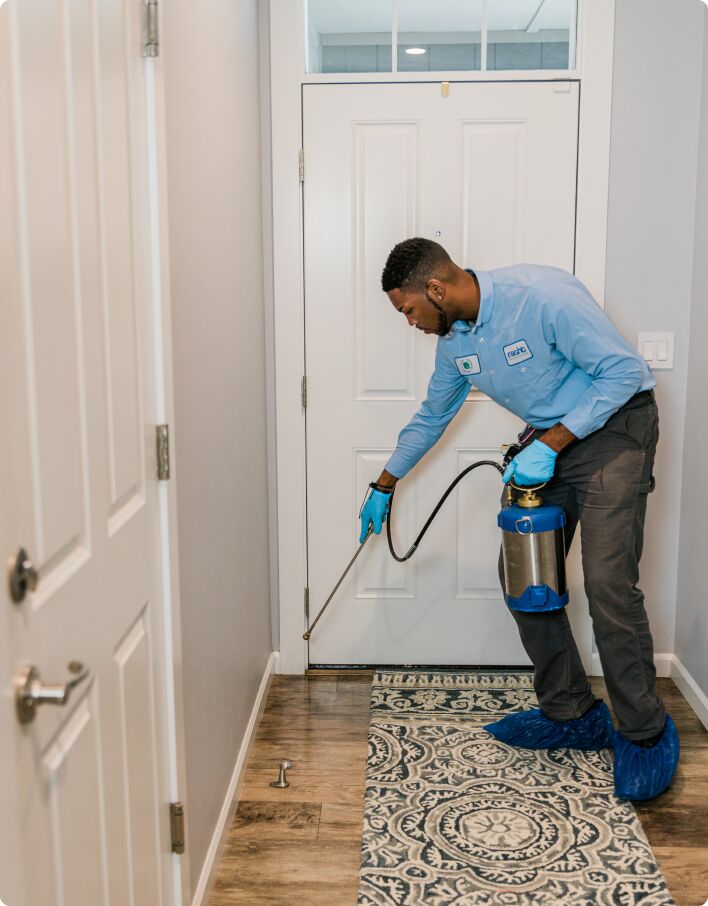A1 Residential Pest Control Portland OR Bed Bugs - Secure Your Home
A1 Residential Pest Control Portland OR Bed Bugs - Secure Your Home
Blog Article
Grasping the Art of Pest Control: Proven Methods for Long-Term Prevention and Obliteration
Pest invasions can be a persistent difficulty for house owners and organizations alike, calling for a strategic method to properly take care of and eliminate these undesirable intruders. By mastering the art of insect control through proven methods for lasting prevention and removal, one can establish a proactive protection against possible threats. Comprehending the habits of pests, applying integrated parasite monitoring methods, and using all-natural treatments are just a couple of essential components vital to achieving long-term success in this endeavor. However, the intricacies of preserving sanitation, carrying out routine assessments, and thorough tracking play just as essential duties in sustaining a pest-free atmosphere. As the fight versus pests proceeds to progress, adopting a thorough strategy becomes vital in protecting your building from potential damage.
Understanding Pest Habits
To efficiently execute parasite control strategies, it is necessary to comprehend the intricate actions exhibited by different bugs in different settings. By studying these habits, parasite control experts can identify the most prone points in the bug's life cycle to target treatments much more efficiently.
Knowing this, bug control specialists can concentrate on sealing entrance points and removing food attractants to prevent these bugs. By addressing wetness issues and securing gaps and splits, invasions can be considerably reduced.
Implementing Integrated Parasite Monitoring
Implementing Integrated Parasite Administration involves making use of an alternative method to deal with parasite issues by integrating various control tactics and strategies. This approach highlights prevention, monitoring, and control of bugs with a combination of organic, cultural, physical, and chemical interventions. By integrating multiple methods, Integrated Parasite Monitoring (IPM) intends to reduce the usage of chemicals while successfully managing pest populations.
One trick aspect of IPM is identifying the specific parasite issue and recognizing its habits and life process. This expertise assists in establishing one of the most appropriate control actions to carry out. Avoidance is additionally an essential concept of IPM, focusing on eliminating factors that attract bugs, such as water, food, and shelter. Regular tracking and assessment are vital to discover pest invasions early and prevent them from escalating.
Moreover, IPM advertises using sustainable and environmentally friendly pest control methods to decrease harm to non-target organisms and the surrounding ecosystem - a1 pest control portland bed bugs. By embracing an Integrated Parasite Management method, services and people can efficiently take care of parasites while lowering reliance on chemical pesticides
Making Use Of All-natural Solutions
Structure upon the foundation of Integrated Pest Management, a change towards making use of all-natural remedies uses an eco-friendly strategy to pest control. Natural solutions harness the power of nature to prevent and get rid of parasites without using severe chemicals that can harm the setting, people, and useful organisms.

Furthermore, planting pest-repelling plants like marigolds, lavender, and mint around yards and homes can help discourage bugs normally. These plants give off smells that bugs locate unpleasant, driving them away without the demand for chemical intervention.
Maintaining Cleanliness and Hygiene

Executing a routine cleansing routine and making sure all participants of the household or workers are educated on proper health methods can go a lengthy method in parasite prevention. By keeping sanitation and hygiene standards, the environment comes to be less welcoming to parasites, eventually sustaining lasting parasite control initiatives.
Regular Examinations and Monitoring
Routine assessments and keeping track of play a crucial function in proactively determining and attending to possible parasite problems before they rise. By conducting regular assessments of both the inside and exterior of a home, pest control experts can detect very early signs of infestations, pest access factors, and problems helpful to parasite task. Surveillance involves using catches, lures, and other devices to track bug task levels and species existing on the facilities. This data is important for figuring out the most efficient treatment techniques and examining the success of parasite control methods in time.
Constant surveillance enables the early discovery of bug issues, allowing quick intervention to avoid extensive infestations that can be difficult and pricey to get rid of. Furthermore, regular assessments and checking assistance to comply with regulatory needs and keep a risk-free, pest-free setting for passengers. Carrying out a proactive method with regular evaluations and surveillance is a keystone of effective parasite management, giving satisfaction and lasting protection against bug risks.
Conclusion
To conclude, understanding the art of parasite control entails understanding pest habits, implementing integrated bug management, using all-natural remedies, preserving sanitation and hygiene, and carrying out normal inspections and surveillance. By complying with these proven strategies for lasting prevention and removal, people can efficiently take care of parasite problems and produce a healthier and much safer environment on their own and their environments.
To properly implement bug control techniques, it is necessary to comprehend the intricate actions displayed by various pests in various atmospheres (portland exterminators a1 for bed bugs). By researching these habits, insect control professionals can identify the most prone factors in the bug's life cycle to target interventions extra successfully
Executing Integrated Insect Monitoring includes making use of an all natural approach to address parasite issues by combining various control methods and approaches. By keeping tidiness and hygiene requirements, the setting comes to be much less hospitable to insects, ultimately sustaining long-term parasite control efforts.
By carrying out regular inspections of both the interior and exterior of a home, insect control experts can identify early signs of invasions, insect entry points, and conditions favorable to bug task.
Report this page